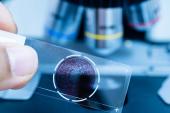Low Incidence of Myocarditis Among Pro Athletes Diagnosed With COVID-19
The reassuring data also highlight the importance of following appropriate screening protocols and avoiding blanket use of MRI.

In one of the largest series of professional athletes with COVID-19, the incidence of myocarditis was rare, just 0.6%, providing reassuring evidence that the virus does not portend long-term cardiac consequences for the overwhelming majority of these competitive athletes.
Among 789 professionals from Major League Soccer, Major League Baseball, the National Hockey League, the National Football League, and men and women from the National Basketball Association, 30 had abnormal results on cardiac screenings, including ECG, echocardiography, and troponin testing. After further testing, inflammatory heart disease was detected in just five athletes; three cases of myocarditis and two of pericarditis.
The new findings, which were published online March 4, 2021, in JAMA Cardiology, should provide reassurances after a number of recent cardiac magnetic resonance (CMR) studies, including some in athletes, suggested that even asymptomatic or mildly symptomatic COVID-19 could result in cardiac injury.
“Some of the papers that came out last summer that were MRI-based, and some individual case reports of athletes and others with mild forms of COVID-19, showed signs of cardiac inflammation, which was basically represented as myocarditis,” senior investigator David Engel, MD (Columbia University Irving Medical Center, New York, NY), told TCTMD. “We didn’t really know the clinical significance of those findings. In reality, what was being described on the MRIs were really quite trivial findings, or very subtle, hard-to-detect signs of inflammation without any corroborating evidence of heart injury.”
In one of the more controversial studies published last summer, for example, German investigators documented abnormal CMR findings in 78 of 100 patients with relatively mild COVID-19. Researchers in the US also made headlines with similar results, including those from a small study of athletes at Ohio State University, where an unusually high incidence of myocarditis and myocardial injury following nonsevere COVID-19 was documented. Another small case report series from Virginia suggested that more than half of student athletes who had mild or asymptomatic COVID-19 had evidence of late pericardial enhancement on CMR, indicative of inflammation.
To TCTMD, Engel said these findings raised alarm bells for physicians, athletes, coaches, parents, and others, but the diagnosis of myocarditis on CMR didn’t exactly follow traditional testing protocols. Cardiac MR, he said, should only be pursued if there are preceding factors that raise the pretest probability of disease. In September, an international group of physicians signed an open letter to cardiology societies to provide guidance on discouraging blanket CMR screening for COVID-19-related heart abnormalities.
“If you take things out of context, you might find a lot of things, and we wouldn’t know what to do with those results,” said Engel. “And that might lead to a lot of unnecessary disqualifications and have a lot of impact, not only for the organization, but also for those athletes where this is their livelihood. A lot of us who do this a lot, you always have to be careful about the time and setting of performing an MRI.”
Each of these cases underwent a lot of scrutiny before they were labelled inflammatory heart disease. David Engel
Paul Thompson, MD (Hartford Hospital, CT), who wasn’t involved in the present study, said the past year has seen a steady drumbeat of studies suggesting a high incidence of cardiac abnormalities in athletes who have had COVID-19. “There are just careers being made [around] writing and publishing about this,” said Thompson, noting that many of these studies were small and with methodologic limitations. This latest paper, however, provides reassurances, noting that the incidence of myocarditis keeps declining as more rigorous research is conducted, as in the present study.
Like Engel, Thompson stressed that an abnormal finding on a test doesn’t mean it will have clinical cardiac consequences. One of the more encouraging aspects of the new report is the conservative approach adopted by professional sports leagues, he said.
“The amount of restraint they used is impressive,” said Thompson. “These are professional teams, so they can test for nearly everything, but they didn’t. They showed a lot of restraint in not going after many of those things. One of the biggest problems we have in medicine is diagnostic creep. You do a test you don’t really need to do, and then you find a borderline abnormality. So, then you do another test to evaluate that borderline abnormality and you find something else. I was really impressed by how little testing they actually did.”
Myocarditis and Risk to Athletes
Myocarditis poses a unique risk to athletes because it can lead to ventricular arrhythmias, and potentially sudden death, when the oxygen demands of the heart increase during intense athletics. It accounts for roughly 5% of all sudden cardiac deaths in athletes.
In this new study, all 789 professional athletes who tested positive for COVID-19, of whom 58% had symptomatic illness, underwent cardiac testing as part of the American College of Cardiology’s return-to-play protocol. This strategy, which was initially published in May 2020 and subsequently updated, included a troponin blood test, 12-lead ECG, and transthoracic echocardiography after the resolution of symptoms and self-isolation. Only if abnormalities were detected did patients undergo further testing, including CMR imaging and/or stress echocardiography.
So far, this has been more of a tempest in a teapot than a tempest. Paul Thompson
The mean age of the athletes was 25 years and nearly all were men (98.5%). Cardiac testing was performed a mean of 19 days after the positive COVID-19 test result. Among the 30 athletes with abnormal test results, 27 were sent for CMR imaging. Just five athletes were held back from returning to their sport because of abnormalities on the scan.
“One of the strengths of the professional leagues is that each individual case went through a lot of medical scrutiny, just because of the high-profile nature of the players,” said Engel. “So, for each of these 30 players with an abnormal test result, team physicians that were very familiar with interpreting cardiac studies in athletes, and in bringing experts in sports cardiology and athlete imaging, were able to come up with not only an appropriate testing plan, but gave a rigorous evaluation of the studies to minimize false-positives and false-negatives. Each of these cases underwent a lot of scrutiny before they were labelled inflammatory heart disease.”
Engel said their study also supports the ACC algorithm recommending initial cardiac screening with troponin testing, ECG, and echocardiography before competitive athletes and professionals return to their respective sports. While the incidence of inflammatory heart disease after COVID-19 is low, it’s not zero, he said. “We did pick up some cases,” said Engel. “It is there.”
To TCTMD, Thompson said that even if the true incidence of myocarditis is 0.6% in athletes diagnosed with COVID-19, as seen in this latest study, that would have a significant impact at the population level. However, it’s possible that myocarditis developed following COVID-19 might be more benign in previously healthy people than currently believed. He also stressed that anxiety about the potential cardiac consequences of COVID-19 presents an opportunity that shouldn’t be wasted. Coaches, athletic trainers, and others should be up to date with CPR training and defibrillators should be on hand, easily accessible, and fully charged.
“Review your emergency action plan in the rare event that something happens, but so far, this has been more of a tempest in a teapot than a tempest,” said Thompson. For most regular folks who contract the virus, they can gradually return to exercise without the need for extensive testing. If sick or hospitalized with COVID-19, checking in with a medical professional before getting back to physical activity is recommended, he added.
Michael O’Riordan is the Managing Editor for TCTMD. He completed his undergraduate degrees at Queen’s University in Kingston, ON, and…
Read Full BioSources
Martinez MW, Tucker AM, Bloom OJ, et al. Prevalence of inflammatory heart disease among professional athletes with prior COVID-19 infection who received systematic return-to-play cardiac screening. JAMA Cardiol. 2021;Epub ahead of print.
Disclosures
- Engel reports no relevant conflicts of interest.
- Thompson reports research support and/or consulting fees from Sanofi, Novartis, Esperion, and Amgen.





Comments